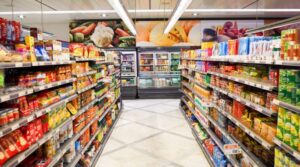Grocery shopping is an essential part of life, but it can often feel like you’re spending more than you should on certain items. While some prices are justified by quality or convenience, others seem to be unjustifiably high. In this blog post, we’ll explore the seven most overpriced grocery store items and offer tips on how to save money on these common purchases.
1. Pre-Packaged Salads

Pre-packaged salads are convenient, but they often come at a steep markup. You’re paying for the convenience of having your greens pre-washed, chopped, and mixed. However, buying the ingredients separately and preparing the salad yourself can save you a significant amount of money. Pre-packaged salads are marked up due to the labor involved in preparing and packaging them. Additionally, they often have a shorter shelf life, leading to higher wastage rates that are factored into the price. Purchase fresh vegetables and greens in bulk. Invest in a salad spinner to quickly wash and dry your greens. This way, you can prepare a week’s worth of salads at a fraction of the cost. You can also experiment with different greens and toppings, giving you more variety and freshness.
2. Bottled Water
Bottled water is another highly overpriced item. Considering that tap water is almost free and typically safe to drink, spending money on bottled water adds up quickly. The environmental impact of plastic bottles is an additional concern. The cost of branding, packaging, and transportation significantly increases the price of bottled water. Additionally, many brands market their water as superior or healthier, which is often not the case. Invest in a good quality reusable water bottle and a water filter if necessary. This not only saves you money but also reduces plastic waste.
3. Pre-Cut Fruits and Vegetables

Like pre-packaged salads, pre-cut fruits and vegetables come with a hefty price tag. You’re paying for the labor of cutting and packaging, which can often double the price compared to buying whole produce. Pre-cut produce is also more prone to spoilage and nutrient loss, which means you’re not getting the best value for your money. Set aside some time each week to cut and prepare your fruits and vegetables. Store them in airtight containers to maintain freshness throughout the week.
4. Brand Name Spices
Spices are essential for cooking, but brand name spices often come with inflated prices. Store-brand spices or bulk spices can be just as good, if not better, at a fraction of the cost. The high cost is often due to packaging, marketing, and branding rather than the quality of the spice itself. Buy spices in bulk from local markets or online stores. Store them in airtight containers to preserve their freshness and potency.
5. Ready-Made Meals
Ready-made meals are the epitome of convenience, but they come at a high price. These meals are often marked up significantly due to the preparation, packaging, and convenience factors. They may also contain preservatives and other additives that you might not want in your diet. Plan your meals ahead and cook in batches. Freeze portions for easy, convenient meals throughout the week. This not only saves money but also allows you to control the ingredients and nutritional content.
6. Organic Produce
While organic produce has its benefits, it often comes with a steep price tag. The premium you’re paying for organic produce might not always be justified, especially for certain fruits and vegetables that have minimal pesticide residues even when conventionally grown. Refer to the Environmental Working Group’s “Dirty Dozen” and “Clean Fifteen” lists to prioritize which organic items are worth the extra cost. For other items, conventional produce can be a more budget-friendly choice.
7. Pre-Shredded Cheese

Pre-shredded cheese is convenient, but it often costs significantly more than buying cheese in blocks and shredding it yourself. Additionally, pre-shredded cheese contains anti-caking agents that can affect its melting quality. By buying cheese in blocks and shredding it yourself using a grater or food processor, you can save money and enjoy better texture and flavor in your dishes.
Conclusion
By being aware of these overpriced grocery store items and taking steps to avoid them, you can significantly reduce your grocery bill. A little extra effort in preparing your own food and making smarter purchasing decisions can go a long way in saving money and improving the quality of your meals.




